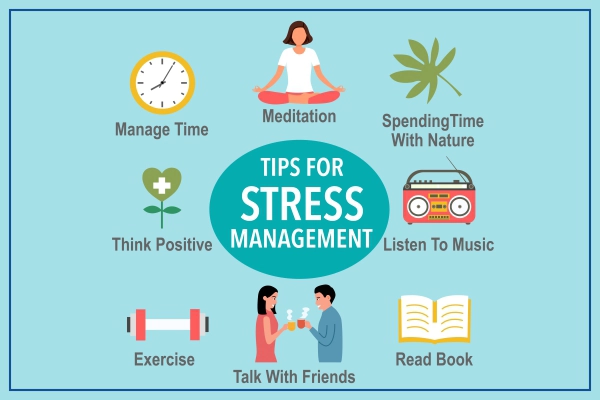
Stress is a common experience in our fast-paced modern world, affecting individuals of all ages and backgrounds. It can have a significant impact on both our physical and mental health, making it crucial to learn how to effectively manage and cope with stress. In this article, we will explore the various aspects of stress, its effects on our well-being, and popular stress management techniques to help you lead a healthier and more balanced life.
Understanding Stress
Stress can be defined as the body's natural response to any demand or threat. It can be triggered by various factors, such as work pressures, financial difficulties, relationship issues, or traumatic events. There are different types of stress, including acute stress (short-term), chronic stress (long-term), and episodic stress (recurring). Each type of stress can have a different impact on our health and overall well-being.
Effects of Unmanaged Stress
When stress is left unaddressed, it can have serious consequences on our physical, mental, and behavioral health. Chronic stress, in particular, has been linked to the development of various health conditions, including heart disease, obesity, high blood pressure, and weakened immune system. On a mental health level, unmanaged stress can contribute to anxiety disorders, depression, and other mood disturbances. Behaviorally, individuals under high levels of stress may engage in unhealthy coping mechanisms such as substance abuse, overeating, or social withdrawal.

Popular Stress Management Techniques
There are several effective ways to manage stress and reduce its impact on our overall well-being. These techniques are not only beneficial for mitigating stress but also for promoting relaxation, improving focus, and enhancing quality of life. Let's explore some of the most popular stress management strategies:
Exercise and Physical Activity
Regular exercise is one of the most powerful tools for combating stress. Physical activity has been shown to reduce the levels of stress hormones in the body, such as cortisol, and promote the release of endorphins, which are known as "feel-good" chemicals. Whether it's going for a brisk walk, practicing yoga, or hitting the gym, finding a form of exercise that you enjoy can significantly improve your mood and reduce stress levels.

Mindfulness and Meditation
Mindfulness is the practice of paying attention to the present moment without judgment. It involves focusing on your thoughts, feelings, and sensations without getting caught up in them. Meditation, a key component of mindfulness, can help calm the mind, reduce stress, and enhance self-awareness. By incorporating mindfulness and meditation into your daily routine, you can cultivate a sense of inner peace and resilience to handle stressful situations more effectively.
Breathing Exercises
Deep breathing exercises are a simple yet powerful way to relax the body and mind. By taking slow, deep breaths, you can activate the body's relaxation response, counteracting the effects of stress on your nervous system. Techniques such as diaphragmatic breathing, box breathing, and alternate nostril breathing can help calm your mind, reduce muscle tension, and improve oxygen flow to your brain.

Time Management Strategies
Effective time management is essential for reducing stress and increasing productivity. By prioritizing tasks, setting realistic goals, and avoiding procrastination, you can create a sense of control over your daily activities. Time management techniques such as the Pomodoro technique, task batching, and creating daily to-do lists can help you stay organized and focused, thereby minimizing stress and overwhelm.
Healthy Diet and Nutrition
The food we eat can have a direct impact on our stress levels and mental well-being. Consuming a balanced diet rich in whole foods, fruits, vegetables, lean proteins, and healthy fats can provide the necessary nutrients to support your body's stress response. Additionally, staying hydrated by drinking plenty of water throughout the day can help maintain optimal brain function and improve resilience to stress.

Choosing the Right Stress Management Technique
With a wide array of stress management techniques to choose from, it's important to find what works best for you. Experimenting with different strategies and incorporating them into your daily routine can help you discover the most effective ways to manage stress. Remember that self-care is not a one-size-fits-all approach, and it's okay to seek professional help if you're struggling to cope with stress on your own.
Conclusion
In conclusion, managing stress is essential for maintaining a healthy and balanced lifestyle. By understanding the various effects of stress on our physical, mental, and behavioral health, and implementing popular stress management techniques such as exercise, mindfulness, breathing exercises, time management, and healthy nutrition, you can effectively reduce stress and improve your overall well-being. Remember to prioritize self-care and make your mental health a top priority in your daily routine. Embrace the power of stress management techniques and take proactive steps towards a happier, healthier life.

FAQs
Q: What is stress and why is it important to manage it?
A: Stress is the body's natural response to demands or threats, and it's crucial to manage it as unaddressed stress can have serious consequences on physical, mental, and behavioral health.
Q: What are the effects of unmanaged stress on health?
A: Unmanaged stress can lead to various health conditions such as heart disease, obesity, high blood pressure, anxiety disorders, depression, and unhealthy coping behaviors like substance abuse.
Q: How can exercise help in managing stress?
A: Regular exercise can reduce stress hormones, promote the release of endorphins (feel-good chemicals), and improve mood, making it a powerful tool in combating stress.
Q: What is mindfulness and how can it help in stress management?
A: Mindfulness is the practice of focusing on the present moment without judgment. It can help calm the mind, reduce stress, and enhance self-awareness, making it effective for managing stress.
Q: How do breathing exercises help in reducing stress?
A: Deep breathing exercises activate the body's relaxation response, calm the mind, reduce muscle tension, and improve oxygen flow to the brain, providing relief from stress.
Q: Why is healthy diet and nutrition important in stress management?
A: Consuming a balanced diet rich in whole foods can provide the necessary nutrients to support the body's stress response and maintain optimal brain function, helping cope with stress effectively.


0 Comments